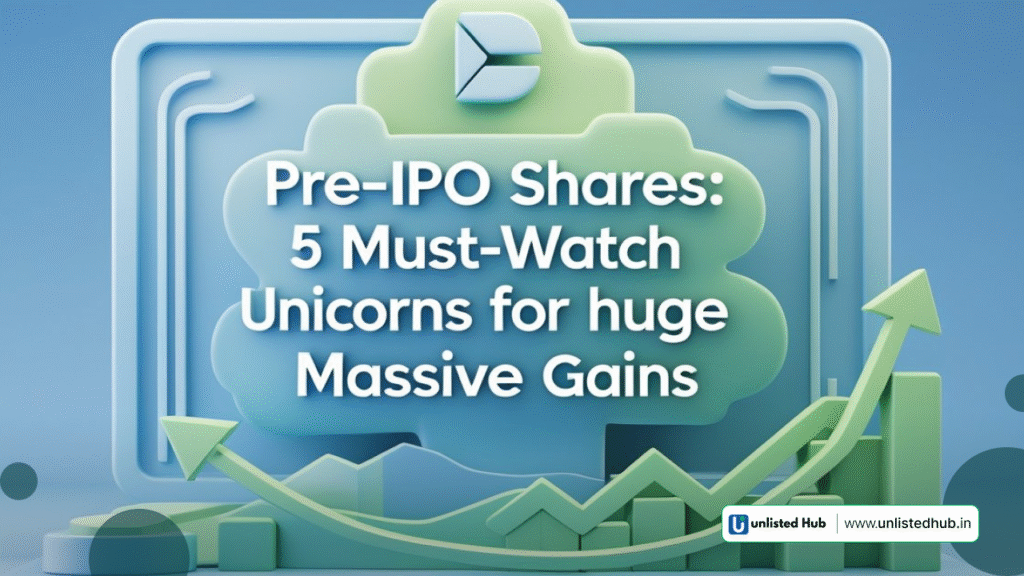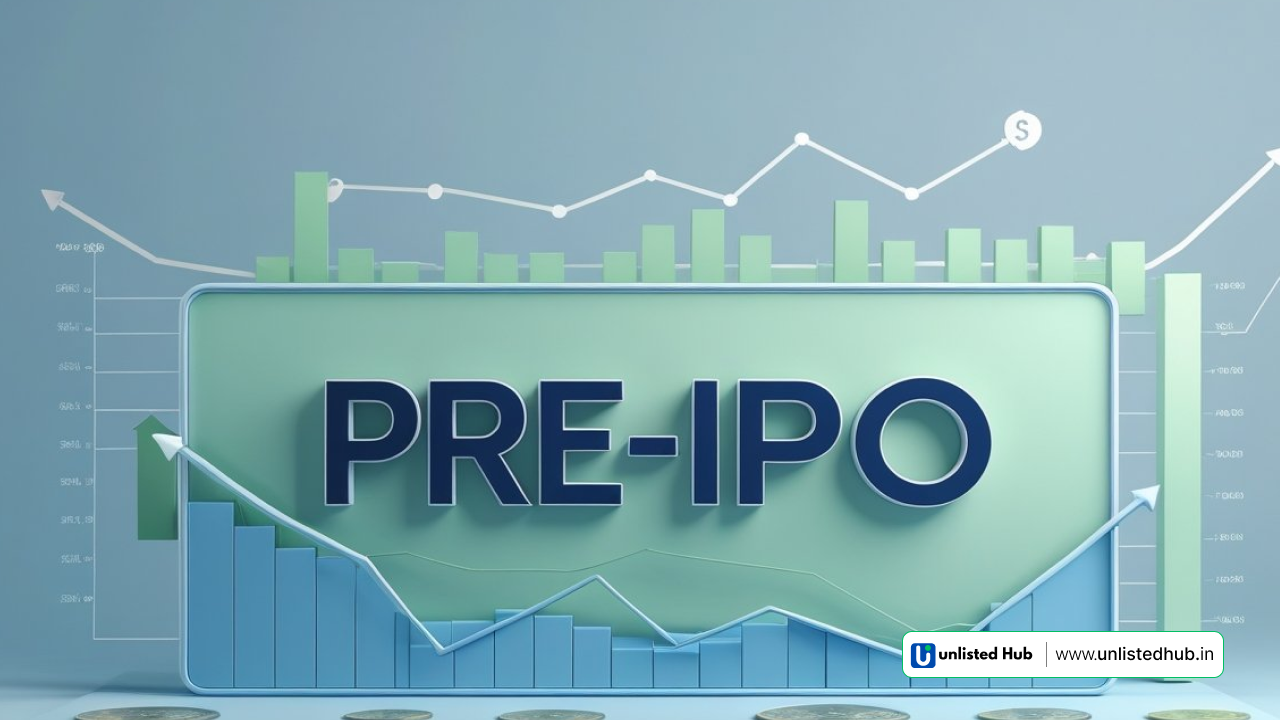SECTION A: What Are Pre-IPO Shares?
=> Pre-IPO Shares are stocks of a company that are offered to select investors before the company goes public.
=> These shares give investors a chance to buy early.
=> Investing in pre-IPO can be exciting but requires understanding the risks and benefits.
~ Key Features of Pre-IPO
| Feature | Description |
| Early Access | Investors get shares before public listing. |
| Growth Potential | Can offer higher returns if the company grows. |
| Limited Availability | Only select investors can buy. |
| Risk Factor | Not guaranteed; company may underperform. |
| Liquidity | Hard to sell before IPO; usually locked in. |
~ Benefits of Pre-IPO Investment
- Opportunity to invest in fast-growing startups
- Chance to gain significant returns post-IPO
- Access to companies not available on stock exchanges
~ Who Can Invest in Unlisted Shares?
- Institutional investors like mutual funds or VCs
- High-net-worth individuals (HNIs)
- Some retail investors through authorized platforms
~ How Pre-IPO Work
- Company announces a funding round before IPO
- Shares are offered to select investors
- Price is usually based on company valuation
- Investors hold until IPO or secondary market allows selling
~ Risks of Startup Shares
- Market price may drop after IPO
- Company may not perform as expected
- Difficult to exit investment before IPO
~ Quick Facts About Pre-IPO
- Not listed on stock exchanges yet
- Often purchased at a discount before IPO
- Can provide long-term wealth if the company succeeds
SECTION B: Which Startups Are Going Public in 2025?
=> Pre-IPO Shares give investors a chance to own a part of a company before it officially lists on the stock market.
=> In 2025, several exciting startups are preparing for upcoming IPOs, attracting attention from retail and institutional investors alike.
~ Top Startups Going Public in 2025
| Company | Sector | Expected IPO Date | Why It’s Popular |
| Groww | Fintech | Nov 2025 | Large user base, rapid growth |
| Lenskart | Eyewear Retail | Dec 2025 | Omnichannel presence, strong brand |
| boAt | Consumer Electronics | Dec 2025 | Popular audio products, loyal fans |
| Pine Labs | Fintech | Dec 2025 | Merchant payments leader |
| PhonePe | Fintech | To Be Announced | Widely used digital payments |
~ Key Details About These Startups
- Groww: Offers mutual funds and stocks, growing fast among retail investors.
- Lenskart: Known for online and offline stores, focusing on eyewear innovations.
- boAt: Famous for headphones and speakers, has a strong brand image.
- Pine Labs: Provides payment solutions to businesses, trusted by merchants.
- PhonePe: Digital wallet and UPI platform with millions of active users.
~ Why Investors Watch Startup Shares
- Gives early access to promising companies.
- Can offer higher potential returns than post-IPO shares.
- Usually limited availability, making them exclusive.
~ Things to Consider
- Risks: Prices may fluctuate, limited liquidity, valuation uncertainties.
- Research: Check company growth, financials, and market trends.
- Platforms: Pre-IPO shares are available through authorized secondary market platforms.
~ Benefits of Investing
- Opportunity to participate in high-growth companies early.
- Potential long-term gains if the company succeeds.
- Adds diversity to your investment portfolio.
SECTION C: How Can I Buy Pre-IPO Shares in India?
=> Pre-IPO shares are becoming popular among investors looking to enter a company before it goes public.
=> Buying them in India requires understanding the process clearly.
1. Understand Unlisted Shares
- These are shares of a company not yet listed on stock exchanges.
- Investors buy them to gain early access before the public listing.
- Prices may vary based on company valuation and demand.
2. Identify Companies Offering Pre-IPO
- Look for unicorn startups or fast-growing firms.
- Check official announcements or investor updates.
- Only consider legally verified companies to avoid risks.
3. Use Trusted Unlisted Share Platforms
=> Investing safely in pre-IPO shares requires using verified platforms. Here’s a quick table for clarity:
| Step | Action | Key Point |
| 1 | Register on platform | Use verified unlisted share platforms |
| 2 | Complete KYC | Required for legal investment |
| 3 | Browse available shares | Check company details and valuation |
| 4 | Place investment | Decide how many shares to buy |
| 5 | Track updates | Monitor company announcements |
-> Platforms provide transparency and reduce risk.
-> Most platforms require minimum investment amounts.
4. Check Eligibility
- Investors must be resident Indians or NRIs.
- Some shares are restricted to high-net-worth individuals.
- Verify eligibility criteria before investing.
5. Review Pricing and Valuation
- Pre-IPO shares are priced higher than the last funding round.
- Compare with the company’s financials and growth potential.
- Avoid companies with unclear or inconsistent valuation reports.
6. Understand Risks
- These shares are illiquid, and cannot be sold easily before IPO.
- Company growth may not meet expectations, affecting returns.
- Use careful analysis and avoid investing large amounts without research.
7. Monitor Updates After Investment
- Platforms provide regular updates on company performance.
- Investors can track IPO dates, funding rounds, and news.
- Staying informed helps in making future investment decisions.
8. Diversify Your Pre-IPO Portfolio
- Don’t invest in only one company.
- Spread investments across multiple startups.
- Reduces risk and increases chances of good returns.
9. Legal Documentation
- Ensure share purchase agreements are signed.
- Retain all proofs of payment and legal contracts.
- Legal safety is crucial for unlisted investments.
SECTION D: Are Pre-IPO Shares Risky?
=> Pre-IPO shares are exciting investment opportunities, but they come with their own risks.
=> Understanding them is key before investing your money.
~ Key Risks of Pre-IPO
| Risk Type | What It Means | How It Affects You |
| Liquidity Risk | Shares are not publicly traded | You may not sell shares quickly if needed |
| Market Risk | Company valuation may fluctuate | Prices can go up or down sharply before IPO |
| Regulatory Risk | Limited regulations for private shares | Can face legal or compliance issues |
| Business Risk | Startup may fail or underperform | Investment may lose value or become worthless |
| Information Risk | Limited data available | Hard to assess true company performance |
~ Why Pre-IPO Shares Can Be Risky
- No Public Trading: Unlike listed shares, pre-IPO shares cannot be sold easily.
- Price Volatility: Prices can change dramatically based on market sentiment.
- Limited Transparency: Startups may not disclose complete financial information.
- High Failure Rate: Many startups fail before listing, making investments uncertain.
- Dependence on IPO Success: Value depends on how the IPO performs.
~ How to Evaluate Investment Risks
- Check company financial statements carefully.
- Research management team and track record.
- Understand market potential and competition.
- Look at investor backing and funding history.
- Avoid putting all money in a single pre-IPO share.
~ Tips to Minimize Risk
- Diversify Investments: Don’t invest only in one company.
- Invest What You Can Afford to Lose: Pre-IPO shares are high risk.
- Use Trusted Platforms: Invest through regulated secondary markets.
- Seek Expert Advice: Financial advisors can guide you.
~ Quick Overview
- Pre-IPO shares offer high potential returns but are risky.
- Risks include liquidity, market, regulatory, business, and information risks.
- Proper evaluation and careful investment can reduce losses.
- Always understand the company before committing funds.
SECTION E: How Are Pre-IPO Shares Priced?
=> Pre-IPO are private company stocks sold before they go public.
=> Understanding their price is crucial for investors to make informed decisions.
=> Pricing is not fixed like listed stocks.
=> It depends on multiple factors and valuation methods.
=> Here’s a simple breakdown:
~ Key Factors That Affect Pre-IPO Share Pricing
- Company Valuation: Higher company value = higher share price.
- Revenue & Growth: Fast-growing startups often have expensive shares.
- Market Demand: More buyers can push prices up.
- Previous Funding Rounds: Price from earlier rounds influences current pricing.
- Industry Trends: Certain sectors may command higher prices due to popularity.
~ Common Valuation Methods
| Method | What It Shows | Simple Explanation |
| Discounted Cash Flow (DCF) | Future cash flow value | Estimates what company will earn in future and converts it to today’s value |
| Comparable Company Analysis | Market benchmark | Looks at similar companies’ value to price the share |
| Precedent Transactions | Past deals | Uses prices paid in previous private transactions |
| Revenue Multiple | Revenue-based price | Multiplies revenue by a factor based on sector standards |
~ How Investors Can Use This Table
- Quick Understanding: Each method shows how companies estimate share value.
- Decision Making: Helps investors decide if the price is fair.
- Comparison: Shows how different methods can give different prices.
~ Steps to Check Unlisted Share Price
- Look at the latest funding round and share price.
- Analyze company growth and revenue trends.
- Compare with similar startups in the same industry.
- Check market demand for the shares.
- Consult valuation methods to cross-check price fairness.
~ Tips for Investors
- Avoid investing only based on hype.
- Check founder credibility and past funding history.
- Use multiple valuation methods to ensure realistic pricing.
- Understand that grey-market prices may differ from actual pre-IPO pricing.
~ Quick Summary
- Pre-IPO share pricing is based on company value, growth, demand, and past funding.
- Using valuation methods like DCF, revenue multiples, and comparables helps determine a fair price.
- Short research and comparing data from multiple methods ensure safer investment decisions.
SECTION F: Why Invest in Unicorn Startups Early?
=> PRE-IPO Shares are gaining attention as smart investors look to invest in unicorn startups before they go public.
=> Early investment can offer huge potential rewards.
~ Benefits of Investing Early
=> Investing in unicorn startups early comes with several advantages:
- High Growth Potential – Startups can grow rapidly in the first few years.
- Lower Entry Cost – Buying early is usually cheaper than buying after an IPO.
- Exclusive Opportunities – Limited investors can access these shares before public listing.
- Diversification – Adds variety to your investment portfolio with high-potential assets.
~ Key Factors to Consider Before Investing
| Factor | What It Means | Why It Matters |
| Company Stage | Early-stage investment | Early entry can increase potential returns if the startup succeeds |
| Team | Founders and management | Strong leadership often predicts growth and success |
| Market Potential | Size and growth of target market | Bigger markets give more opportunity for returns |
| Funding History | Previous investments | Shows confidence from other investors |
| Exit Strategy | IPO or acquisition plan | Determines how you can sell or monetize your shares |
~ How to Identify the Right Unicorn Startups
=> Look for these indicators:
- Startups solving real problems with scalable solutions.
- Companies with strong revenue or user growth trends.
- Startups backed by reputable venture capital investors.
- Innovative products or services with a competitive advantage.
- Clear plan for public listing or acquisition.
~ Risks of Investing in Pre-IPO Share
- Liquidity Risk – You may not be able to sell easily before IPO.
- Valuation Risk – Price may be overestimated, leading to lower returns.
- Business Risk – Startups may fail or underperform.
- Regulatory Risk – Must comply with local laws for pre-IPO investing.
~ Tips for Smart Pre-IPO Investing
- Do thorough research on the startup and its market.
- Diversify across multiple startups to reduce risk.
- Check funding history and investor credibility.
- Understand your investment horizon and exit options.
- Keep track of market trends and updates on pre-IPO shares.
SECTION G: Which Sectors Have Top Pre-IPO Companies?
=> Pre-IPO shares are attracting attention across different sectors as more startups prepare for public listing.
=> Understanding the sectors helps investors make smarter decisions.
~ Top Sectors with Pre-IPO Companies
=> Here’s a simple overview of sectors where pre-IPO shares are trending:
| Sector | Why It’s Popular | Key Features |
| Fintech | High growth in digital payments and lending | Mobile banking, digital wallets, payment platforms |
| Edtech | Rising demand for online learning | E-learning apps, test prep platforms, skill development |
| Healthcare | Expanding health services and tech | Telemedicine, diagnostic services, health apps |
| SaaS (Software) | Businesses adopting cloud tools | CRM software, project management tools, automation apps |
| E-commerce | Growing online shopping market | Marketplaces, niche online stores, delivery tech |
| Electric Vehicles (EV) | Shift to sustainable transport | EV startups, battery tech, charging infrastructure |
~ Sector Highlights
- Fintech: Rapid adoption of online payments and financial services is boosting pre-IPO activity.
- Edtech: Online learning platforms are expanding fast, attracting significant investment.
- Healthcare: Startups focus on telemedicine, digital diagnostics, and health tracking.
- SaaS: Software as a service companies are scaling globally, with high valuation potential.
- E-commerce: Online retail is growing steadily, with many startups preparing for IPOs.
- EV: Electric vehicle startups are gaining traction, supported by government incentives.
~ Key Trends to Watch
- Investors follow sector trends to identify high-potential pre-IPO companies.
- Tech-driven sectors dominate, but healthcare and EVs are gaining faster attention.
- Startups in these sectors often offer innovative solutions and high growth potential.
~ Quick Facts for Easy Understanding
- Pre-IPO shares are mostly from tech-focused sectors.
- Fintech, SaaS, and e-commerce dominate investor interest.
- Emerging sectors like EV and healthcare are gaining more investors.
- Short-term trends can change based on market demand and government policies.
~ Why This Table Helps
- Quick glance at sectors and their popularity.
- Shows why investors are interested.
- Easy to compare opportunities across sectors.
- Bullet points make information clear and actionable.
SECTION H: Do Pre-IPO Shares Give Better Returns?
=> Pre-IPO shares are becoming popular among investors who want early access to high-growth companies.
=> Many wonder if these shares can deliver better returns than regular investments.
~ How Pre-IPO Shares Work
- Investors buy shares before the company lists on the stock market.
- Prices are usually lower than IPO prices.
- Offers a chance to earn high returns if the company grows fast.
- Risk is higher because the company is not yet public.
~ Returns Potential
- Pre-IPO shares can give significant returns in short or medium-term.
- Some startups double or triple their value after listing.
- Returns depend on company performance and market conditions.
- Not all pre-IPO shares perform well; some may remain flat.
~ Quick Investment Comparison
| Investment Type | Risk Level | Potential Return | Notes |
| Pre-IPO Shares | High | Very High | Early access, higher risk |
| Listed Stocks | Medium | Moderate | Established companies, more stability |
| Mutual Funds | Low-Medium | Moderate | Diversified, less risky |
| Bonds | Low | Low | Safe, fixed returns |
~ Observations:
- Pre-IPO shares offer higher potential returns than listed stocks and mutual funds.
- Higher risk comes with higher reward potential.
- Suitable for investors ready to handle uncertainty.
~ Factors Affecting Returns
- Company Growth: Strong growth can lead to higher gains.
- Market Trends: Favorable market conditions improve returns.
- Industry Performance: Some sectors perform better than others.
- Timing: Early investment before listing usually offers better returns.
~ Advantages of Pre-IPO Shares
- Early access to high-growth startups.
- Opportunity to buy at lower prices than IPO.
- Potential for exponential gains in a short time.
- Helps diversify investment portfolio with alternative assets.
~ Risks to Keep in Mind
- Companies may underperform or fail.
- Limited liquidity; selling before IPO can be hard.
- Requires careful research and monitoring.
- Not suitable for risk-averse investors.
~ Key Points for Smart Investors
- Analyze company financials carefully.
- Compare potential returns with traditional investments (investment comparison).
- Consider market trends and timing.
- Diversify to reduce risk.
SECTION I: Are Pre-IPO Shares Legal in India?
=> Pre-IPO Shares are gaining attention from retail investors, but many wonder if buying them is legal in India.
=> Let’s explain this in an easy and clear way.
~ Legal Status of Unlisted
- Pre-IPO shares are unlisted shares sold before a company goes public.
- Buying them is legal if you follow government and SEBI rules.
- Investors should ensure they deal with registered platforms only.
- Unauthorized trading can lead to legal issues.
~ Key Rules to Follow
| Rule | Description | User-Friendly Tip |
| Registered Platform | Shares must be bought through SEBI-approved platforms | Check platform registration before investing |
| Minimum Investment | Companies may set a minimum buy limit | Ensure you can meet the minimum before applying |
| Documentation | PAN, KYC, and agreement required | Complete all documents to avoid rejection |
| Lock-in Period | Some shares have a waiting period before selling | Know the lock-in period to plan your exit |
| SEBI Regulations | All trades must comply with SEBI regulations | Follow SEBI rules to stay legal |
~ How to Stay Safe While Investing
- Use SEBI-registered brokers or platforms.
- Avoid peer-to-peer unverified deals.
- Keep all documents and receipts.
- Verify the company’s authorization for pre-IPO share sale.
- Understand the lock-in period before investing.
~ Common Investor Questions
1. Can I sell pre-IPO shares anytime?
-> No, some shares have a lock-in period.
2. Do I need to pay taxes on pre-IPO shares?
-> Yes, profits are taxable under capital gains.
3. Are all startups allowed to sell pre-IPO shares?
-> Only SEBI-compliant companies can issue shares legally.
4. Can retail investors participate in all pre-IPO shares?
-> Some shares are reserved for institutional investors only.
~ Benefits of Legal Pre-IPO Investing
- Opportunity to invest early in high-growth companies.
- Potential for large profits at IPO listing.
- Helps investors diversify portfolios.
- Provides a regulated and safer investment route.
FREQUENTLY QUESTIONS ASKED
Other Investors Are Exploring
Unlisted Shares India || Private Equity Investments || Pre-IPO Investment Opportunities || Unicorn Startups India || Best Unlisted Stocks 2025 || SEBI Regulations on Unlisted Shares || How to Buy Unlisted Shares || Unlisted Share Price List || ESOP Shares Trading || Unlisted Share Market India
| Financial Research Analyst






